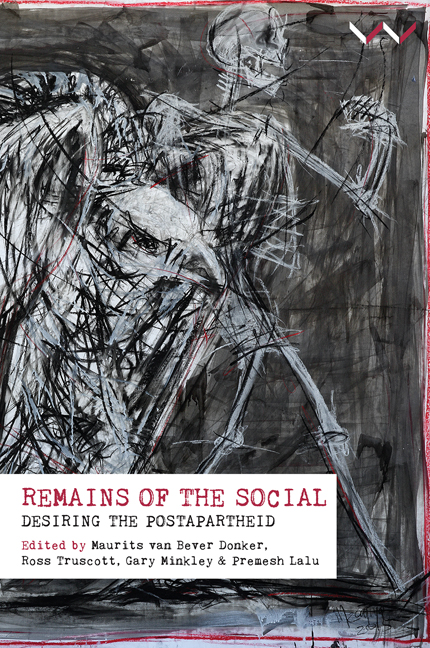Book contents
- Frontmatter
- Contents
- Acknowledgements
- Preface
- Chapter 1 Traversing the Social
- Chapter 2 The Mandela Imaginary: Reflections on Post-Reconciliation Libidinal Economy
- Chapter 3 The Return of Empathy: Postapartheid Fellow Feeling
- Chapter 4 The Ethics of Precarity: Judith Butler's Reluctant Universalism
- Chapter 5 Hannah Arendt's Work of Mourning: The Politics of Loss, ‘the Rise of the Social’ and the Ends of Apartheid
- Chapter 6 Souvenir
- Chapter 7 Re-Cover: Afrikaans Rock, Apartheid's Children and the Work of the Cover
- Chapter 8 The Graves of Dimbaza: Temporal Remains
- Chapter 9 The Principle of Insufficiency: Ethics and Community at the Edge of the Social
- Chapter 10 The Trojan Horse and the ‘Becoming Technical of the Human’
- About the Contributors
- List of Figures
- Index
Chapter 1 - Traversing the Social
Published online by Cambridge University Press: 21 April 2018
- Frontmatter
- Contents
- Acknowledgements
- Preface
- Chapter 1 Traversing the Social
- Chapter 2 The Mandela Imaginary: Reflections on Post-Reconciliation Libidinal Economy
- Chapter 3 The Return of Empathy: Postapartheid Fellow Feeling
- Chapter 4 The Ethics of Precarity: Judith Butler's Reluctant Universalism
- Chapter 5 Hannah Arendt's Work of Mourning: The Politics of Loss, ‘the Rise of the Social’ and the Ends of Apartheid
- Chapter 6 Souvenir
- Chapter 7 Re-Cover: Afrikaans Rock, Apartheid's Children and the Work of the Cover
- Chapter 8 The Graves of Dimbaza: Temporal Remains
- Chapter 9 The Principle of Insufficiency: Ethics and Community at the Edge of the Social
- Chapter 10 The Trojan Horse and the ‘Becoming Technical of the Human’
- About the Contributors
- List of Figures
- Index
Summary
What is South Africa? We have perhaps isolated whatever it is that has been concentrated in that enigma, but the outline of such analyses has neither dissolved nor dissipated it in the least. Precisely because of this concentration of world history, what resists analysis also calls for another mode of thinking. If we could forget about the suffering, the humiliation, the torture and the deaths, we might be tempted to look at this region of the world as a giant tableau or painting, the screen for some geopolitical computer. Europe, in the enigmatic process of its globalization and of its paradoxical disappearance, seems to project onto this screen, point by point, the silhouette of its internal war, the bottom line of its profits and losses, the double-bind logic of its national and multi-national interests (Derrida, ‘Racism's Last Word’ 297–298).
The blackmail of whiteness
As Jacques Derrida reminds us, it is not possible to ‘forget about the suffering, the humiliation, the torture and the deaths’, in short, the weight of lived experience that was and is apartheid. At the same time, particularly when we consider apartheid as a question that extends beyond its own borders, it remains both necessary and urgent to distil the question of what he calls ‘South Africa’, to shape it and focus it as a problem for thought, so as to enable the possibilities of thinking what we in this volume call, without hyphenation, the postapartheid, neither a point in time nor a political dispensation, but rather a condition that names the labour of coming to terms with and working through the desires, principles, critiques and modes of ordering that apartheid both enabled and foreclosed. One of the tasks that we set for ourselves in this introduction is to provide a sense of this terrain on which the postapartheid unfolds.
Let us begin, then, by turning to a recent intervention into the social. Introducing their edited volume, Re-Imagining the Social in South Africa: Critique, Theory and Post-Apartheid Society, Peter Vale and Heather Jacklin argue that ‘when apartheid ended, critical thinking ended’ (1). The conditions of this ‘shift from critique to subservience’ (2) are to be found, they argue, in ‘post-apartheid South Africa's incorporation into the logic and exigencies of global neo-liberal capitalism’ (7).
- Type
- Chapter
- Information
- Remains of the SocialDesiring the Postapartheid, pp. 1 - 39Publisher: Wits University PressPrint publication year: 2017



